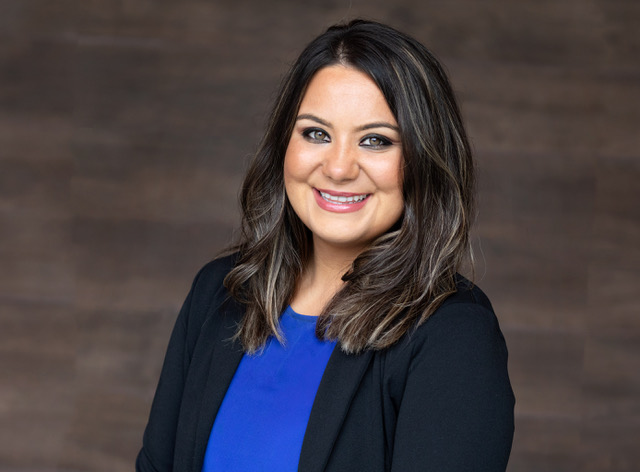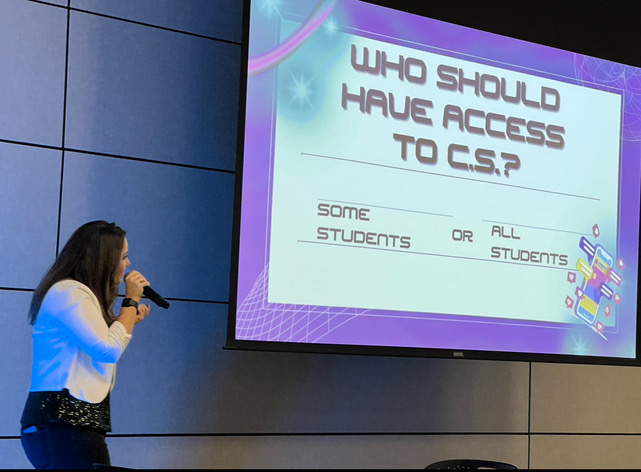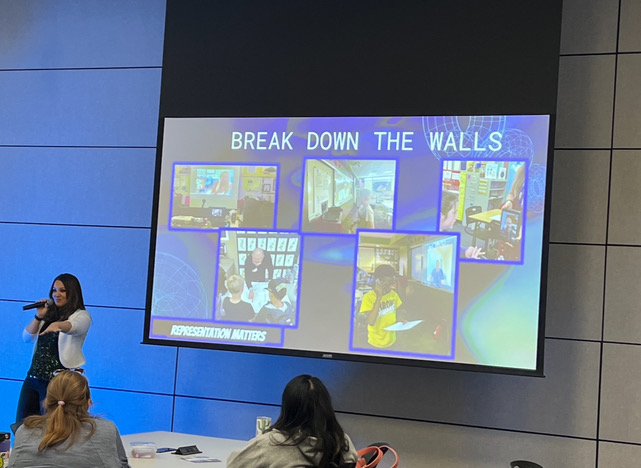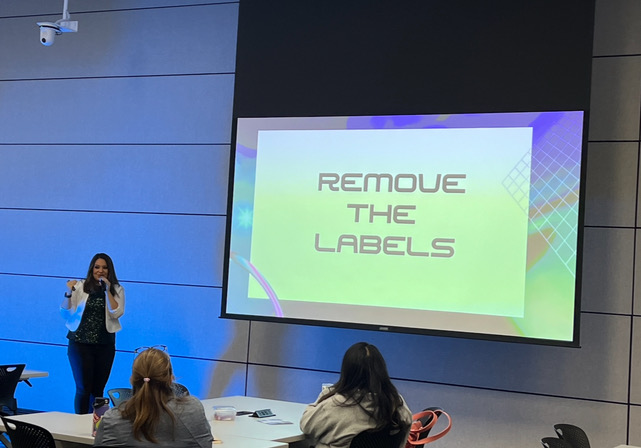
All students can succeed at computer science, no matter what labels have been placed on them – and no one knows that better than Lisa Moe, a 6th grade teacher at Philistine Rondo School of Discovery. Lisa is a participant in the CSTA Equity Fellowship, a selective, year-long program designed to develop leadership in equitable teaching practices and advocacy. Read on to hear Lisa’s practical advice about bringing CS and computational thinking to middle schoolers!
I have a BA in Cultural Anthropology from UCLA, a MA in Teaching from UC Irvine, and a MS in Educational Technology from Cal State Fullerton. I have always had an interest in science, specifically technology, and always have my own “I wonder” questions in my mind. Unfortunately, I had a few teachers growing up that discouraged this path for me for a variety of reasons, such as my gender or not having what they considered a “math” or “science” brain. Decisions were made for me and as much as these moments would devastate me, they also forced me to take ownership in my learning. I decided that I was going to work hard to overcome any roadblock placed in my educational and professional journey…while working towards disrupting the inequities that exist within education. It encouraged me to pursue opportunities in STEM and Computer Science learning, which allow me to break down barriers and open the door for my students by removing the labels placed on them in their educational journey.
As a teacher, my primary role extends beyond academic knowledge. It is my responsibility to shape students to be critical thinkers, problem solvers, and responsible digital citizens. I introduce students to the core elements of computational thinking – decomposition, pattern recognition, abstraction, and algorithm design – in a variety of contexts. I love integrating these elements into math and science by breaking problems into smaller parts and models. Additionally, I connect them with reading and social studies to bring their learning to life and see computational thinking through my students’ eyes. I also enjoy introducing coding and robotics across the curriculum and encouraging the use of digital tools for creative expression!

One of my students has been learning from home via Zoom this school year while battling cancer. By providing her with opportunities to learn coding, nurture creation, and find their voice, she is able to collaborate with her classmates on projects and bring her ideas to life. Whether in her bedroom or from a hospital bed, she has been an inspiration to others by innovating incredible projects based on her personal experiences. Additionally, she was able to bring her most recent project to our county’s Computer Science Showcase and share her creations alongside her fellow classmates. She created a glove that interprets certain hand signals onto the Micro:bit in order to communicate with those struggling to speak. She is more than her diagnosis — she is a computer scientist impacting the world.
Something that truly brings learning to life for my students is connecting with professionals that look like them and meeting other students throughout the world using EdTech-safe tools. Through bringing in an experienced architect to our classroom, my students learned firsthand how to interpret the school’s original blueprints and apply them to Minecraft to redesign the school in different locations to fit the criteria of certain natural disasters. This has shown my students that their learning is a world beyond the four walls of our classroom and that they do have a voice that should be heard – whether vocally or through their ideas and inventions.

When it comes to equity within my practice, I am a firm believer that every student has the right to accessible and equal learning. Computer science is a necessity to not only prepare students for their future careers, but to encourage and support creative expression, problem solving, digital citizenship, and proactive leaders – today. Additionally, it is a tool that allows students to express and connect, socially and emotionally. By exposing and encouraging students of all backgrounds to computer science, I enhance opportunities for equity and representation, while strengthening and shifting existing education models.
I once had a 4th grade student with Dyslexia who told me on the first day of school that they “would not be reading” or participating in our school’s reading program. It was important to me that she be able to see that she was so much more than this label she carried and to nurture a growth mindset of “Yes I Can.” I was able to welcome Olympic Super Star Keri Walsh Jennings through Zoom to speak with my students. What no one anticipated was her opening up about her own Dyslexia and how she did not consider it a “disability” but rather her “super power”. I will never forget my student’s face as she turned to me and said “She is like me.” That student went on to be not only one of my top readers that school year but found her voice through coding and innovating projects to support other students like herself. Through representation, she learned that her “superpower” was her ability to overcome the challenges on her journey and pay it forward.
I teach students that everyone has their own backgrounds and stories. Many of my students enter my classroom with a label of having learning disabilities, Autism, and/or lack self esteem, confidence, or motivation. Some of my other students are labeled as "Gifted," and therefore, so much more is expected out of them. One of my biggest takeaways is removing the labels that are placed on my students through STEM and computer science learning – nurturing their inner confidence, strength, and leadership. There no longer is such a thing as "math" or "science" brained – because we are all innovators and leaders of our knowledge. I am not just teaching computer science – I am teaching my students to remove their societal labels and limitations and instead, use their curiosity, creativity, and learning to pay it forward. If we can grow the confidence and nurture empathy, compassion, and respect in our students through the use of computer science, they will use computer science to make a positive difference in our world.

Honestly, my best advice for both educators and students is to know that mistakes and failures are the starting line to the next decision of their path. If we can make our learning environments safe, and encourage a growth mindset for educators and students, we can support them in how they define success. The more we encourage people to take pride and ownership in their learning, the more we can help them connect the dots to their future in STEM fields.
During my undergrad at UCLA, I was interning in the digital department for Conan O’Brien. As different as this role is from education, it has truly impacted my career. Not only did this experience fuel my passion for technology and help me learn about STEM in television, but I was also able to see firsthand the way Conan O’Brien engages an audience while remaining true to himself through spreading kindness and supporting his staff through positive leadership. When I left my position at his show to pursue teaching, I was often asked by people “Why would you leave?” and my answer has always remained the same: the job I wanted most was Conan’s! Since I am clearly not taking that from him, I took my experience into the classroom where I get to be “Conan'' every single day with my students by creating a space of fun, engaging, and oftentimes, comical learning that allows for them to feel respected, encouraged, and supported. He has a famous quote that says: “If you work really hard, and you're kind, amazing things will happen.” I live by this quote, and in my life, hard work and kindness has truly led me to amazing things.